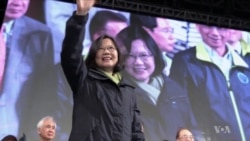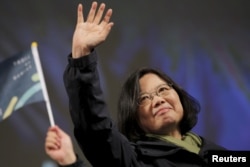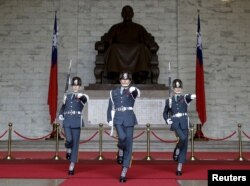Taiwan's voters gave Tsai Ing-wen and her pro-independence Democratic Progressive Party or DPP a new mandate Saturday, helping it seize control of both the legislature and presidency for the first time ever. Dealing with the island’s neighbor and political rival China will be one of her biggest challenges and concerns.
Tsai Ing-wen won a landslide victory over the Nationalist Party (KMT) Saturday. The KMT spent the last eight years growing ties with Beijing and Tsai ran on a platform that calls for diversifying the island’s economic ties.
New chapter
The victory will open a new chapter in Taiwan’s history, but the China that the island faces today, is much different from the first time Tsai’s DPP won the presidency in 2000.
“The People’s Republic of China geopolitically, militarily and economically is far more powerful than it was 16 years ago and second of all there is an authoritarian leader in charge in the PRC who I think is in many ways more ominous,” says Larry Diamond, a senior fellow at the Hoover Institution and close watcher of Taiwan’s democratic development.
Diamond says that there is no democracy in the world that faces the same kind of intimidation and pressure that Taiwan does in the shadow of China. And that, he says, underscores, president-elect Tsai’s need for caution in managing relations with China.
China Model
How Beijing treats Taiwan will also be key.
As China markets itself as an alternative global power, its actions in the South China Sea, crackdown on dissent on the mainland and Hong Kong are increasingly a source of concern.
“Hong Kong demonstrates that the vision that China has is one that the people who would be subject to it are unhappy with. People in Hong Kong are very unhappy with the attempts by China to put more and more controls on the place,” says Bruce Jacobs, a Taiwan specialist.
He says that how the relationship develops is really up to Beijing.
“Actually everyone in Taiwan wants good relations with China and it’s the Chinese that control whether the relationship is good or bad.”
Democratic identity
Following the elections, China reasserted its view that the self-ruled island is part of its territory, arguing that the democratic vote would not change as it put it, that “basic fact” or “international opinion.”
The comments were in sharp contrast to Tsai’s remarks following the elections, who called for respect of Taiwan’s “democracy, national identity and international space.” She also warned that any form of suppression would harm the stability of cross-strait relations.
“What I think that they sometimes fail to understand — the leaders in Beijing — is that for Taiwanese, democracy is their identity and this political system is definitive of Taiwan,” says Shelley Rigger, a Taiwan scholar at Davidson College in the eastern state of North Carolina.
For now, analysts say, China will give Tsai some breathing room and wait at least until she delivers her inaugural address. Tsai was elected Saturday, but does not take office until May 20.







